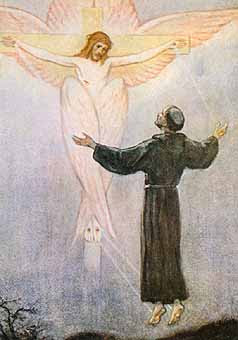Blessed Feast of St. Francis!
It is our custom that the Abbess should give a spiritual conference on the vigil of great feastdays. Here is our Mother Abbess' reflection for today's feast of Holy Father St. Francis:
I find very much that the Feast of the
Stigmata of our Holy Father St. Francis so well captures his spirit that I have pretty much
remained there on the mountain of LaVerna since then, especially during the
solemn novena of these days. It was a period of great solitude for our seraphic
father and it seemed that he wanted me to learn more about solitude from his
own life. The “dark night” and
solitude with illumination is not just Carmelite spirituality, it is very much
the spirit of our Father St. Francis.
Our Father Francis, from his conversion, deeply
felt the Spirit’s call to follow in the footsteps of Christ and not be
conformed to the spirit of the world. The three-fold opening of the Gospel made
clear the path for him to walk.
In his later years, he also felt the Spirit
moving him to share more deeply in the life and even in the death of
Christ. He was led into the desert, the
wilderness, of the mountain of LaVerna,
to be
alone with the Alone, and to await the revelation of His will.
When he went to the mountain of LaVerna, it
was precisely for the intention of seeking God in solitude and discerning His will
for the future. Francis was bearing a
very heavy interior Cross of purification, which you could very well call a
darkness which brought him into deep silence and interiority, so much so that
he could not be in the presence of his brothers, as he was not his usual joyful
self. He wanted to penetrate the
darkness and the pain, or allow God to teach him the meaning of it, and find
the grace and strength to persevere.
Francis went for true solitude, seeking
God, not himself, nor did he desire to be isolated from his brethren, because
he carried them always in his heart and prayer. .
The biographers tell more of the sentiments
of his heart, those who knew him well, his early companions: He goes to seek a place of rest and secret
solitude; to know in what manner he could cling more perfectly to the Lord God
(at this stage in Francis’ life of great conformity to Christ, he still seeks
to know how he can be more perfect and love Him more completely!); to bring to
complete fulfillment what he had earlier simply and devotedly begun. He was looking for a clear word from God
about what he was to do.
And God did speak, most profoundly, uniquely
in the heart and in the flesh of our father Francis. How infinitely good God
is! First He spoke a word of great
consolation, peace and sweetness to confirm the heart of Francis in His Love
and then He allowed our seraphic father to be all the more perfectly conformed
to His Son in the reception of the Sacred Stigmata.
First God consoled him in a tremendous way:
through the vision and the conversation of the seraph, he experienced the
majesty and tenderness of God. St.
Bonaventure relates “As he was drawn aloft through ardent longing for God and
was praying on the mountainside, he saw what appeared as a seraph with six
bright wings gleaming like a fire descending from the heights of heaven.” The vision of if filled his heart with joy
and delight together with compassionate love for Christ nailed to the
Cross. His soul was left aglow with
seraphic love, and in his body he bore the wounds of Christ.
“Because
of this new and astounding miracle unheard of in times past, Francis came down
from the mountain a new man.”
Is this
not the fruit of true contemplation? We
are changed, we become more like Christ, and we overflow with compassion and
love. His companion, Brother Leo, said
Francis enjoyed consolations from his encounter with God in contemplation for
the rest of his days.
This unique encounter with Christ was for
Francis a strengthening grace, too, so he could endure with patience and even
joy the struggles and the trials that were besetting him.
Francis’
intimate communion with God on the holy mountain LaVerna stamped a precise
character on his way of following Christ from then on. And coming forth from this experience he
sings of the God he knows more fully: He
composed his “Praises”:
“You are
good, you are all good, the highest good
You are
love, you are beauty, you are humility



Comments